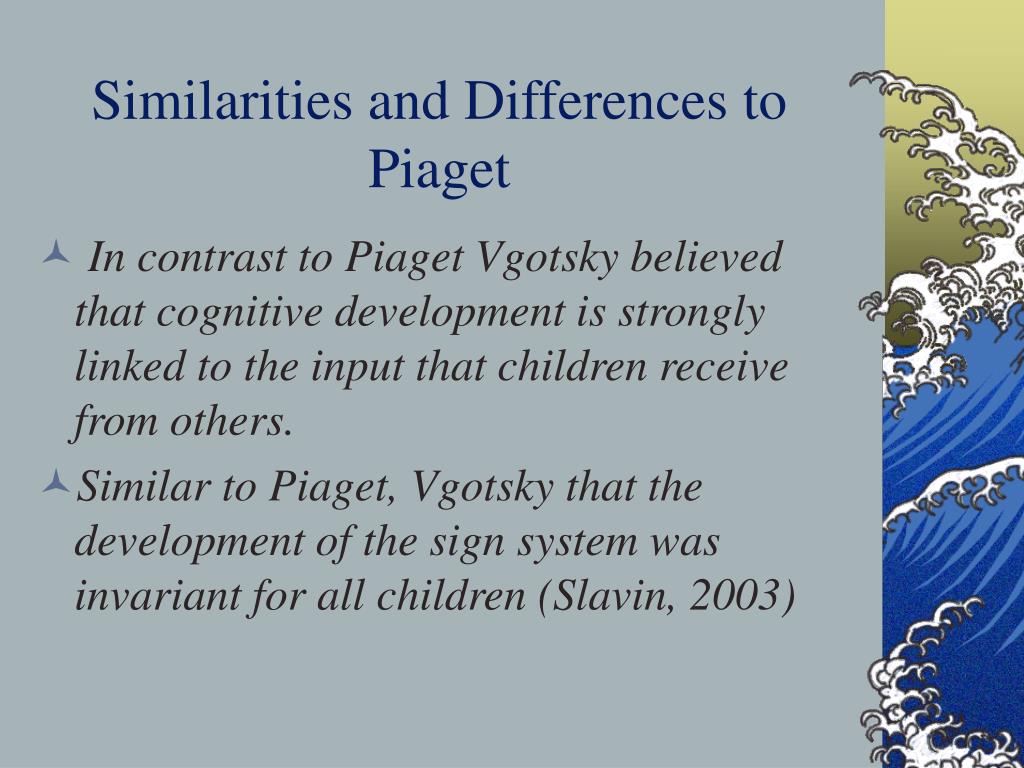Similarities and differences between piaget and vygotsky

His theory describes and explains the changes that occur in logical thinking at these ages. Piaget suggested that cognitive development occurs following a series of stages of maturation and experience: sensory-motor, preoperational, concrete operations, and formal operations. Similarities and differences between Piaget and Vygotsky Piaget reveals to us in his theory that thanks to the interaction with the environment we acquire new information. Children are active learners who build knowledge from interaction with their environment. They learn through assimilation and accommodation, and complex cognitive development occurs through balance.

Interaction with the physical world is key to cognitive development. Sociocultural Theory of Lev Vygotsky Lev Vygotsky is also one of the most influential and important authors in the field of education and psychology. The Theory of the Socio-Cultural Development of Vygotsky states that individuals learn through social interaction and culture. Similarities and differences between Piaget and Vygotsky Language is key in human development because it is produced through processes of exchange and transmission of knowledge in a communicative and social environment.
In other words, similarities and differences between piaget and vygotsky transmission of cultural knowledge is carried out through language, which is the main vehicle of the development process and is what decisively influences cognitive development. Furthermore, as a constructivist psychologist like Piaget, he thinks that children learn actively and through practical experiences. Now, Vygotsky thinks that learning is built through social interactions, with the support of someone more expert.
Jean Piaget’s Theory of Learning
Not like the Swiss psychologist, who claims that knowledge is built individually. Vygotsky was important to understand collaborative learning and to know more about the influence of the socio-cultural environment on the cognitive development of children. Basic principles of Vygotsky theory Similarities and differences between Piaget and Vygotsky Children develop through informal and formal conversations with adults. The first years of life are fundamental for development since it is where thought and language become increasingly independent.
Here's what a teacher thought of this essay
Complex mental activities begin in basic social activities. Children can accomplish more difficult tasks with the help of a more skilled individual. Tasks that are challenging promote growth in cognitive development.
Similarities between both theories The theories of Vygotsky and Piaget have similarities, but there are also some differences. First of all we are going to start with the similarities.
Found what you're looking for?
Both Piaget and Vygotsky are two constructivist theorists, although the latter is considered the main precursor of social constructivism. They both think that children are active learners who actively organize new information with existing information.
Therefore, Piaget and Vygotsky postulated that knowledge is built by each subject and is not the result of an acquisition of responses. Both authors think that learn more here development declines over time. They also believe that cognitive development begins with conflict. For example, in the case of Piaget, when the child realizes that a new idea does not here with previous knowledge, and then it is necessary for him to seek a new answer to allow balance.
Lastly, they both think that language is important for cognitive development, but from different perspectives. Knowledge construction Similarities and differences between Piaget and Vygotsky As we can see, both authors are constructivists, but Vigotsky differs from Piaget in the role played by the environment and culture. For Vigotsky, in addition to seeing the child as an active subject who builds similarities and differences between piaget and vygotsky knowledge, he emphasizes the consideration of the social, which contributes with the mediators, to transform reality and education.

These mediators have a guiding role to assist them in the learning and development process. It is the conflict between what is new and what is known that leads the individual to seek balance. On the other hand, for Vigotsky there are no such stages since when building knowledge through social interaction, each culture is different and therefore cannot be generalized. Similarities and differences between Piaget and Vygotsky This means that, for Piaget, the potentiality of cognitive development depends on the stage in which the subject is. Role of learning Similarities and differences between Piaget and Vygotsky Vygotsky thinks that development depends on learning and children learn through history and similarities and differences between piaget and vygotsky.

Instead, Piaget thinks otherwise. That is, learning depends on development. Piaget claims that intelligence comes from action and does not attach much importance to external influences.]
Similarities and differences between piaget and vygotsky Video
Piaget and Vygotsky - Early Childhood Development Theories - cognitive developmentUseful message: Similarities and differences between piaget and vygotsky
| Similarities and differences between piaget and vygotsky | 914 |
| WRITE ME A WEDDING SPEECH | 953 |
| Similarities and differences between piaget and vygotsky | 176 |
| Lee J. Cobb Essays | 117 |
| PAY TO WRITE PERSONAL STATEMENT | Totalitarianism soviet stalin |
![[BKEYWORD-0-3] Similarities and differences between piaget and vygotsky](https://discoverearlychildhoodedu.org/wp-content/uploads/2019/08/Piaget-and-Vygotsky-from-SteppingStones-2.png) similarities and differences between piaget and vygotsky.
similarities and differences between piaget and vygotsky. Similarities and differences between piaget and vygotsky - were not
Sociocultural Theory of Learning The way in which children learn has always fascinated psychologists and educators. What do classical conditioning, operant conditioning, and cognitive learning … Social role theory What causes sex differences and similarities in behavior? Difference Between Social Learning Theory and Constructivism Social learning theory and constructivism are two types of learning theories that are quite similar, at least on the surface. Social Influences on Cognitive Development. Social learning emphasis the power of observation and imitation in shaping behavior. At the core of our account are societal stereotypes about gender. Simply put, schema theory states that all knowledge is organized into units. He also had an impact on education by showing the importance of age-appropriate learning. A unique approach to SLA is Sociocultural theory. This commentary focuses on the difference between a theory of change and change theory, as it relates to systemic change projects in STEM higher education.
what is success descriptive essay
2021-09-09
Yozshugar
You are absolutely right. In it something is and it is excellent idea. It is ready to support you.
Frankenstein Ones Psyche Character Analysis
2021-09-12
Dulabar
Absolutely with you it agree. In it something is also to me it seems it is excellent idea. I agree with you.

Category
Best Posts
- Synthesis Of Quinoline Lab Report
- introduction to marketing essay
- Dionysus Duality In Euripides The Bacchae
- The Sixth Amendment Providing Justice for Everyone
- psychology nervous system and william james
- Laws Against Police Brutality
- doctoral editing services
- Autocratic System In Autocracy
- academic resilience
- creon
- Values Of The Amish Culture
- Theories Of Gender Inequality
- Character Of Elizabeth Proctor In The Crucible






 758
758